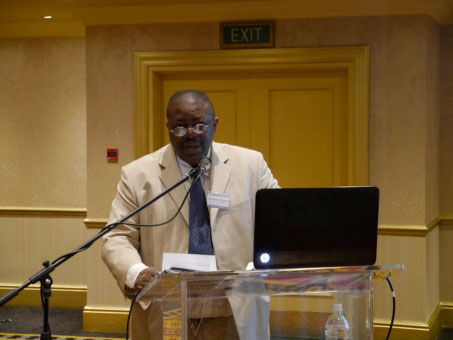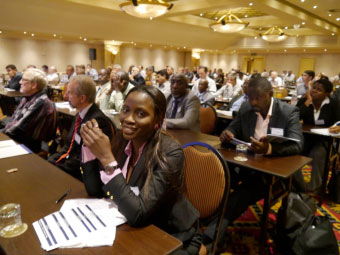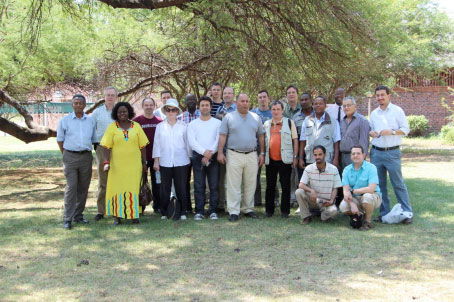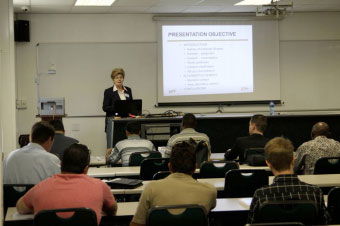
The first conference on Advances in Cement and Concrete Technology in Africa (ACCTA 2013) was held at the Emperor’s Palace Resort in Johannesburg, South Africa, over 28-30 January 2013. More than 200 scientists and industry representatives from 47 nations, including 20 African countries, attended this three-day conference, paving the way for ACCTA to be developed into a biannual event.

Chairman Prof Herbert Uzoegbo (Wits) opens
the event on behalf of the organising committee
The concept for this premier ACCTA conference was developed by the African-European research cooperation SPIN and mainly organised by the BAM Federal Institute for Materials Research and Testing (Germany) and the University of the Witwatersrand (South Africa).

Delegates during the conference in the plenary lecture room
Keynote speakers
Each day of proceedings comprised three parallel sessions under the themes of: Materials and Mix Design, Structural Concrete and Durability, and Concrete and the Environment. A number of expert keynote speakers were also invited to introduce focus topics over the course of the three days.
Leading the way on Day 1, Prof Karen Scrivener (EPFL Lausanne) and Prof Arezki Tagnit Hamou (Sherbrooke University) opened the technical sessions by discussing the topic of new and innovative cements and binder materials. In the afternoon Prof Amde M Amde (Maryland University) and Prof Mark Alexander (Cape Town University), who also opened the conference on behalf of RILEM, reported on durability issues from different viewpoints.
Keynote speakers on Day 2 included Prof Piet Stroven (TU Delft), Dr Mohamed Sonebi (Queens University Belfast), and Prof Gideon PAG van Zijl (Stellenbosch University), who spoke about a computational approach on concrete technology, recent developments in the field of self-compacting concrete and crack formation in advanced materials, respectively.
The morning keynote sessions of the final day focussed on ecological and sustainable concrete. Keynote presentation on this area were given by Professor Sofiane Amziane (Blaise Pascal University) and Boudewijn Piscaer (Univerde). Professor Frank Dehn (Leipzig University) also reported on the new fib model code later in the day.
Research accolades
One particular highlight was a special session for young researchers from South Africa and Germany within the context of the German-South African Year of Science. At the end of the session a prize was awarded to the best research authors from each country having been judged by an international panel of experts. The winners were Yared Assefa Abebe (Leibnitz University Hannover) and Suvash Chandra Paul (Stellenbosch University), who won a half-year research visit to Witwatersrand University and BAM, respectively.
Networking and hospitality
Alongside the technical programme, delegates were given plenty opportunity to engage in discussion and the exchange of ideas. A day trip to the Pilanesberg National Game Reserve was also organised as part of the hospitality programme.

Delegates at the Pilanesberg Game Reserve

Prof. Dubravka Bjegovic (IGH, University Zagreb) lecturing
during the courses at the Witwatersrand University
Witwatersrand lectures
Prior to the conference, a two-day course at the Witwatersrand University campus was well attended by a high number of delegates, students and industry representatives.
Parallel daily courses were given on:
• Admixtures and Cement Extenders
• Loading on Concrete Structures,
• Durability, Assessment and Repair
• Concrete Technology
• Green Concrete.
Looking to the future...
The meeting was concluded with discussions on the development of ACCTA into a conference series. It was agreed that an international Africa-focused cement and concrete event should be permanently established and hosted every two years in different venues across the continent. The next meeting will again be held in sub-Saharan Africa and interested organisations are invited to apply to host ACCTA in 2015.
More thoughts on this year’s ACCTA event, including several presentations, can be viewed at: www.accta2013.com. Proceedings – edited by Herbert Uzoegbo (Witwatersrand University) and Wolfram Schmidt (BAM) and peer-reviewed by an international scientific committee – comprise 1218 pages with 134 papers related to cement and concrete technology with focus on Africa, developing countries as well as state-of-the-art techniques and new materials.
Information on forthcoming conferences will be posted on the ACCTA website in due course.